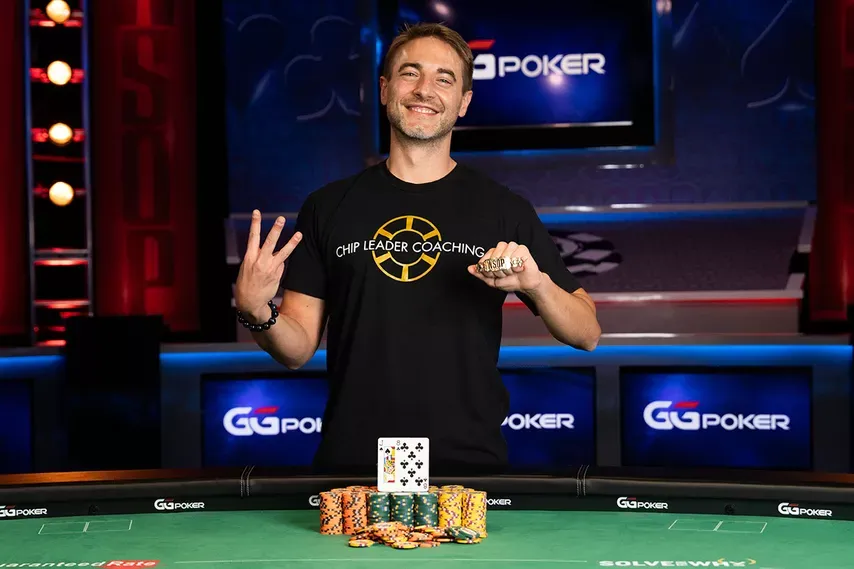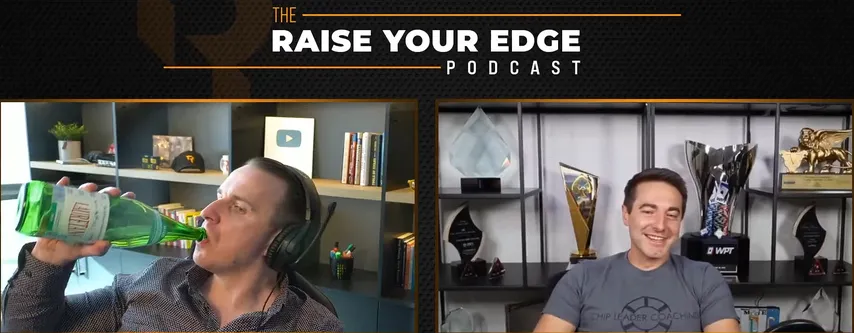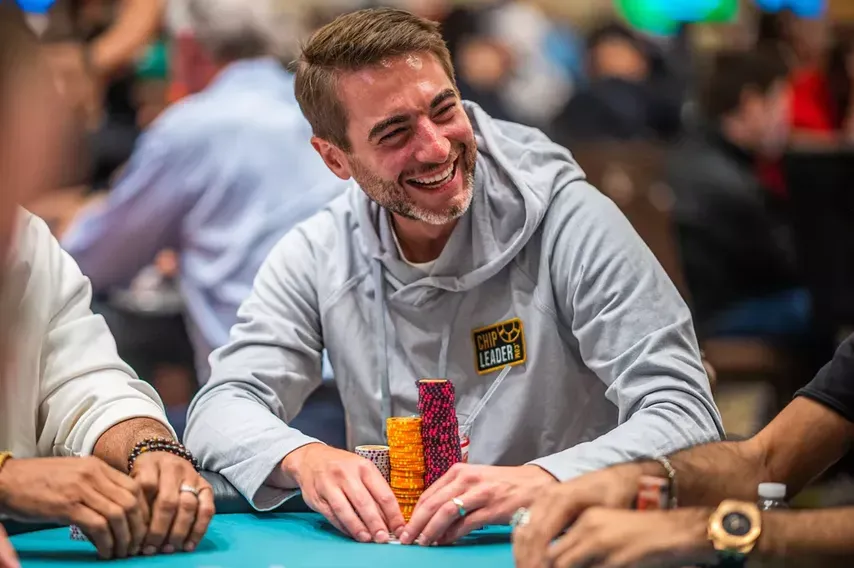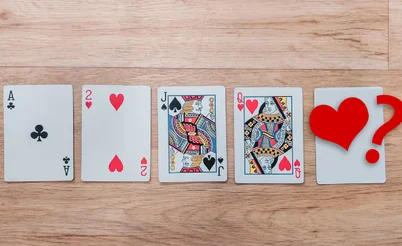– Poker is booming and if I were in your shoes, how do you choose what to play this year? Where do you go? You could literally play any week somewhere in the States and you probably have some big tournament and cash game streams. It's insane. Maybe you can share with us a little bit on what your plans are for this year, but also more from the perspective of our audience. How do you choose good games, whether it's live or online? How do you design your schedule to make sure you play the most profitable games?
– I think one thing that can be overlooked sometimes is the expense of travel. When you have bankroll considerations, you take the total number of buy-ins that you're playing, multiply it by an expected EV, and then you actually have to subtract expenses – the expenses to get there, the cost of food, hotel, etc. I think that's something that's often overlooked. Now for people like you and me, it's pretty easy. I go to where there's a bunch of big stuff to play, so Seminole Hard Rock WPT in April, WSOP, etc. But I think if I was on the come up and I was really trying to make money, I'd probably do a lot of the World Series of Poker circuits or the smaller buy-ins where there's a handful of different things to play, but also the expenses are a lot cheaper because it's one of the maybe second tier casinos.
– So for you right now, biggest buy-ins, get me in those, and I don't care about the rest?
– I typically don't travel when it's just one good tournament or something like that. For me to travel, they have to have a good series. Honestly, this entire year 2024, I've just been working on making Chip Leader Coaching as good as I can. I've never actually spent time focusing on the company, I've only focused on playing. So it's been a really enjoyable experience because, just like poker, business has its own problems. For problem solvers like you and I, you have to figure out where your leaks are in poker, you have to figure out where your leaks are in business and plug them and make them better.

– Where are you right now? Where are you based?
– About a year ago, my family and I moved to Nashville, Tennessee. There are actually no casinos in Tennessee. I haven't really been playing at all. I found a couple of private cash games that are soft, so when I get bored I'll go play, but they're not very big. It's more just the fact that I still enjoy playing. I like people, it's fun to get out of the house and go do that.
– How is family life in Tennessee compared to the good old days of just grinding?
When I was in Vegas, there was just so much to do, so much to play, it was just hard to work on a company. You wake up and there's an $1,100 at the Venetian, I'm going to go see what's up. But here, it's really easy to have a schedule, to go to the gym, to sleep every night at a reasonable hour, and to solve the other problems that aren't poker. It's been incredibly rewarding.
Foxen and I have been recording almost every day. We just completed Brace 1002, which is a review of his $250K final table with extra interviews and talks of how to play certain stack sizes and different board textures and stuff like that. Just a lot of content that we thought people would be excited to see. Now that we're done with that, I'm really excited to start playing again. This is the longest I've ever gone without traveling to play poker.
– In April you got a trip to Florida and then WSOP, you'll be in Vegas the whole time?
I'm sending my wife and kid to China for three weeks, so it'll be easy to just focus on grinding.
– You sent them there for a vacation or do you have friends and family over there?
– My wife's Chinese, her mom lives there. Their first trip back was last October because of COVID. My daughter finally got to meet her grandma on that side. We wanted her to speak Chinese, so having a trip back every year, the timing with the WSOP coincides very nicely for me to be able to focus and play 12-14 hours a day.
– How do you believe that people can make consistent winnings? We have this debate – solvers, GTO, but also you have cash games, tournaments. What do you guys try to teach new and upcoming poker players?
– The biggest thing we try to teach them is how to think instead of just memorizing outputs. Solvers definitely have their place and they are important, but knowing how to deviate and knowing why the solver does what it does is considerably more important than memorizing an output.
If you just memorize an output and you know that versus the big blind you're going to c-bet small on King-8-3-2 if the stack depth is X, well that's cool if you get the same board texture. But if you understand why the solver is choosing to bet small there, then all of a sudden you get a similar board texture or one that's way different, you're like "Oh I remember that this is a board that my opponent has a lot of auto-continues on, so I should choose a larger sizing."
So it's more about teaching them how to think. That's the biggest thing.
Chance Kornouth Talks About His Early Poker Career
– When did you start playing poker?
– I grew up playing just random cards with change with family members where you couldn't even check-raise and it was just poker and stuff like that. Check-raising was not allowed.
But then as I got older, in high school when the Moneymaker boom happened, I started to play with friends. We used pennies as poker chips in the $5 and $10 buy-in games. When I got into college it really started to get more serious. Very early on I was 8-tabling cash games and a couple of tournaments on the side. If I got to the final table in the tournaments, I would quit the cash games. If I busted the tournaments, I would end the session.
For the longest time, I have always grinded super hard. I think that's something that is very underrated. People think that they just deserve a big score or they're due or whatever, but in reality, you have to put in the volume, you have to put in the work. I remember getting to the final two or three tables in the Sunday Majors like 6-7 times before I actually even won one, which was pretty discouraging at the time. But you just realize you don't always run good down the stretch. I'm sure I made some mistakes as well.
Then I finally had a big bankroll and focused a little bit more on tournaments starting in probably 2007, when I was once I started the company. From there it's just been some private cash games, some tournaments, and grinding the company
– When was your first year that you would consider you took it more professional and you also started having some more consistent winnings?
– I was winning consistently I would say sophomore year, maybe junior year of college, so 2006-2007.

– Did you finish college or did you drop out?
– I stopped a semester shy. My major was architectural engineering, but even since freshman year I knew that I had no interest in it whatsoever.
I found it easy and had a 3.7 or 3.8 GPA when I ended up dropping out, but it was actually my math professor who gave me the courage to quit. He was like, "Wait, you're good at this, you make good money at it, and you enjoy it. Why are you still here?" He's like, "You can always come back to college."I just took $40K of my $50K, went to Vegas for three weeks, met Ben Lamb, moved in with him a month later, and that was that's pretty much it.
– That's a crazy story. You spun it up that year or did Vegas give you a hard time?
– The series that we played was in the Fontana Lounge at the Bellagio, which isn't even there anymore, it's the Hyde nightclub now. It was some of the toughest series ever. I was playing with Ruthless and Ben Lamb and just all these sick online guys at the time.
Ben was raise-folding every hand and we were 7-handed. He folds under the gun and the cards kind of arc and they hit the table and they either flip over or the dealer has to expose them, and it's Ace-10 or Ace-Jack. I'm like, "Guy's raise-folding every hand, what the f***."
I look at him, he's in the 2 seat, I was in the 3, and I go, "You did that on purpose." And he goes, "I'm Ben Lamb, we need to be friends." A month later I moved in with him and that actually gave me the confidence. I had my first $50K day, my first six-figure month that month. Or at least when I got home from that trip, I was playing a bunch of heads up PLO and tournaments and just absolutely crushing.
Then I moved in with him, lived on the Strip for a couple years, and partied super hard. I would say that chapter of my life is finished now. I'm completely sober these days. I wanted my child to have a sober parent and have something that I didn't have. I can say that there's definitely some FOMO and there's times where I miss it, but overall it's a huge net positive.
– Did you make a lot of mistakes in your youth that you regret now?
– Oh yeah, I have tons of regrets, absolutely. I mean, I made like tons of mistakes when I was playing big old private cash games and losing massive percentages of my net worth in a night. Early in my career, before I had a family and responsibilities, I ran it up to a million and down to 100K so many times. Then I finally realized that I don't need to play the absolute nosebleed cash games in order to make a good living.
Ever since I have been more responsible with my bankroll, the amount of money in the bank account just slowly climbs up, and life's good and much less stressful, I would say.
– Why would you play in those games? Was it just an ego thing or was it also greed?
– I think it was partially greed, but I'm sure ego had a lot to do with it as well. A lot of the elite poker players, I would say a lot of us are very competitive.
I think I did just want to try to beat those games, but the problem was a lot of them would only invite me when I was drinking and partying. Yes, if sober I'm going to be the best player in the game, but when I'm blackout drunk, maybe not.
– How did you recover after losing six-figure sums in one night?
– I've always been pretty mentally strong, I would say. Early on, I think it was 2009, I had the one-on-one package with Tommy Angelo and worked on my mentality. I actually purchased it in the hopes that it would help a couple of horses that I had at the time, not knowing that it would be so life-changing for me. The other two horses don't really play poker anymore, ironically, but it helped me. I won my first bracelet the very next year and I've had a high level of success since working on my mindset.
I think that's one thing that is very underrated in poker.
No one wants to work on their mindset and it's one of the most important aspects. I think that there are tons and tons of poker players who could maybe pass a theoretical test. You send them a hand history, and they can get the right answer, but then they get to the poker table and they just make these mistakes. They know it's a mistake and they still do it. Being able to play your best at all times, or as often as possible, is a poker superpower.

– Would you say when you started out, let's say your first or second year, whatever the period was where you had all those final tables and you were lucky, would you say you played also a winning strategy and on top of that, you've been also lucky? Or were you just playing bad and you were lucky?
–Oh no, I was playing an extremely winning strategy. As you know, back then, people were under 3-betting and too passive and too tight in a lot of spots. You basically just got to be incredibly active preflop, have a lot of front-side aggression, and you just got to pick up so many pots because people didn't fight back correctly versus a preflop raise.
– I don't think you have been very lucky. I would actually say that you have been very unlucky and you made actually the best out of it. If I would take 100 players that did not have the proper mindset yet, take the average dude and put him in your position, I would say 98 out of 100 would blow up their bankroll, they would go broke, because they overestimate themselves.
– I mean, after I won my first bracelet in 2010, it was a $500K score in the $5K PLO. I swapped out 75%, so I'm left with a little over $300K, and then taxes, so $200K. I started playing pretty high-stakes PLO and lost the vast majority of it back, went from $300K back to $100K, had to move down and rebuild. That's something that I've done a ton in my career, not anymore, but moving down and rebuilding the bankroll is something that I do think takes a little humility, knowing that, "All right, I don't have this the bankroll to play the stakes anymore. I have to move down." Obviously, when you move down, if you do have that skill set, your win rate goes up, the variance goes down, and it's a lot easier to rebuild when you just go to a stake that you know that you're crushing.
The State of Online and Live Poker
– Do you play any online or online tournaments, online cash, or mostly live right now?
– I don't really play online cash. Once or twice a year, I'll find a poker club and grind it for a couple weeks and a friend will be, "Hey, it's a really good spot, you should come put in some volume."
To go a little off topic, that's one of the best ways to make money in poker. You find a good spot where you're a favorite in it and you're confident you're going to get paid, you're not going to get cheated. You go and you put in the volume. My wife's always been incredibly supportive of that. If I'm going to work, if I'm going to grind for 12 hours a day every day, because it's a good spot, she'll handle everything she needs to. But in general, I'll still play a couple times a month on ACR on Sundays.
– What do you think are the main differences between live and online when it comes to the skill level of poker players?
– Well, the biggest, people always say it's a completely different game and I always just say, "No, it's the same game, but live poker just has an extra element of information." Your ability to look at your opponent, you get to a new table online and it's player 6742. You really don't have any info other than maybe their stack size or the location, but live it's, "How old is he? How does he stack his chips? What is he wearing? Is it a girl or a boy?" You always have some information immediately and you get to make conclusions about your opponents much faster.
Yeah, but regarding the actual initial question of the primary difference, I would say that live people are afraid to look stupid. So they don't pull the trigger in certain spots if their cards have to show. They're afraid to pull the trigger on a bluff that they might online, or they're afraid to call an all-in because the cards have to get shown and they look stupid.

– Timing tells are of great importance online, and they are much more reliable than in a live game. Because online players consider themselves protected and do not take good care of themselves. Even the best players make mistakes all the time, it's only natural.
– I’m sure you wouldn’t have achieved your results online if you played exclusively GTO. This applies to all top regs.
– Yes, none of us even play GTO. If we take a scale from 0 to 100, where 100% is a perfect GTO bot, then the best players do not play even 10%, and maybe even 5%. If you look at the ICM simulations of the finals in multiway pots, people play just awful. The only thing we have more or less mastered is preflop and what textures we need to continuation bet on.
– My students often send me hands with the words: “You said to play this way, but GTO Wizard does not agree with it.” I'm already tired of explaining that GTO teaches you how to play against another bot, and I teach you how to play against people. A person cannot have a balanced check range on a monotonous board . If your opponent checks, he most likely has a weak card, and if he bet, he most likely has a strong card. It is very simple to operate. In general, I am sure that solvers are one of the reasons why there are still such weak lineups in poker. People don’t want to think; it’s easier for them to remember ready-made solutions. I always welcome solver children at my table.
– Many will be surprised, but here I agree with you 100%. I think this is the best time in poker in the last 10-15 years. The compositions are excellent, the guarantees are off the charts. 10 years ago the best tournament was the $200 Sunday Million, which took place once a week. Look in the GG lobby now, several similar tournaments take place almost every day. I started playing in 2009 and from day one I heard that poker is dying.
Are you currently working with poker or business coaches or psychologists? Are there any mentors?
– This is mainly related to business. My wife and I go to a club in Nashville where, on average, everyone is 15-20 years older than us. Very rich and smart people gather there; in terms of success, I am in the bottom 5%. Friendly dinners are held there, during which completely different topics are discussed. They helped me a lot with our training project. They listened carefully and gave some advice on how to improve both the content itself and its sales.
And Alex Foxen helps me with poker – he is my main partner at Chip Leader Coaching. If I have any difficulties, we just sit down, discuss the topic and record a video for the site. Usually, they are the most useful.
– Can you imagine playing poker until you’re old?
– It’s unlikely now. In the last couple of years, my interests have shifted heavily towards business and investing. I can see myself playing the WSOP Main Event as long as I can hold cards in my hands. But I’m unlikely to grind the entire series for 7 weeks, as I plan to do this year. But it’s too early for me to end my professional career; I haven’t said my last word on Triton yet.
– What do you get the most pleasure from that doesn’t involve poker and your family?
– I love betting on sports. This is one of my main shortcomings.
– What are you betting on?
– For everything except baseball. I can even bet on a sport I know nothing about. I have never played against a casino, it’s not interesting to me at all, I have completely eliminated alcohol and drugs from my life, but deep down I remain a gambler. Betting is a kind of outlet for me. Everyone will agree that watching sports is much more interesting when it is staged.
“I don’t see anything wrong with this, as long as you control yourself and don’t engage in self-destruction.” We allow ourselves to spend a large sum in an expensive restaurant. The main thing to remember is that betting is entertainment, not a way to make money.





















